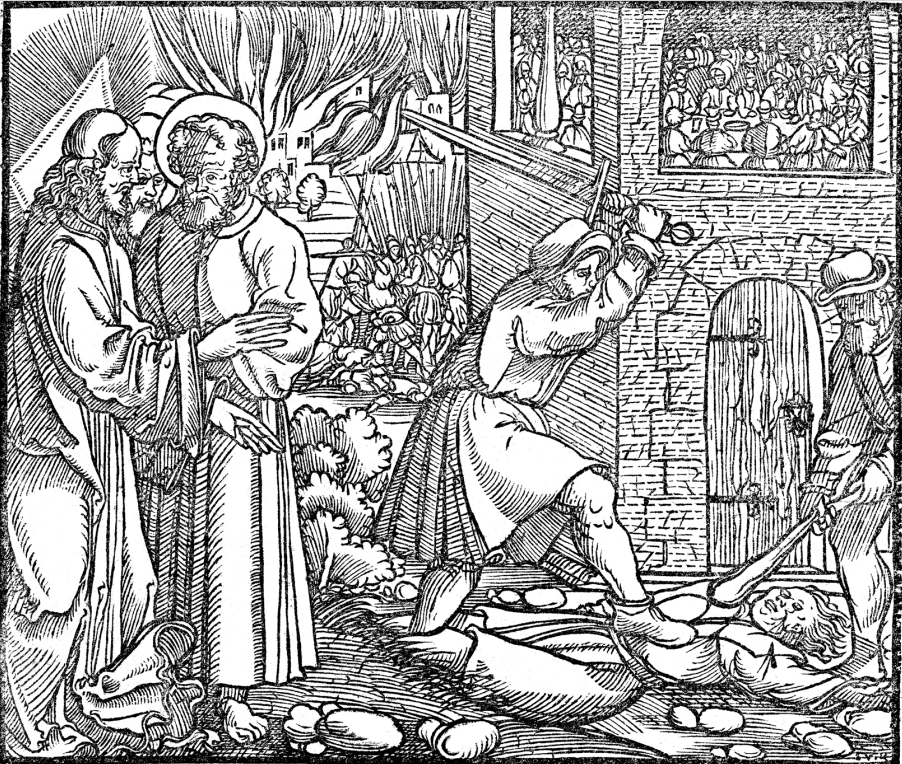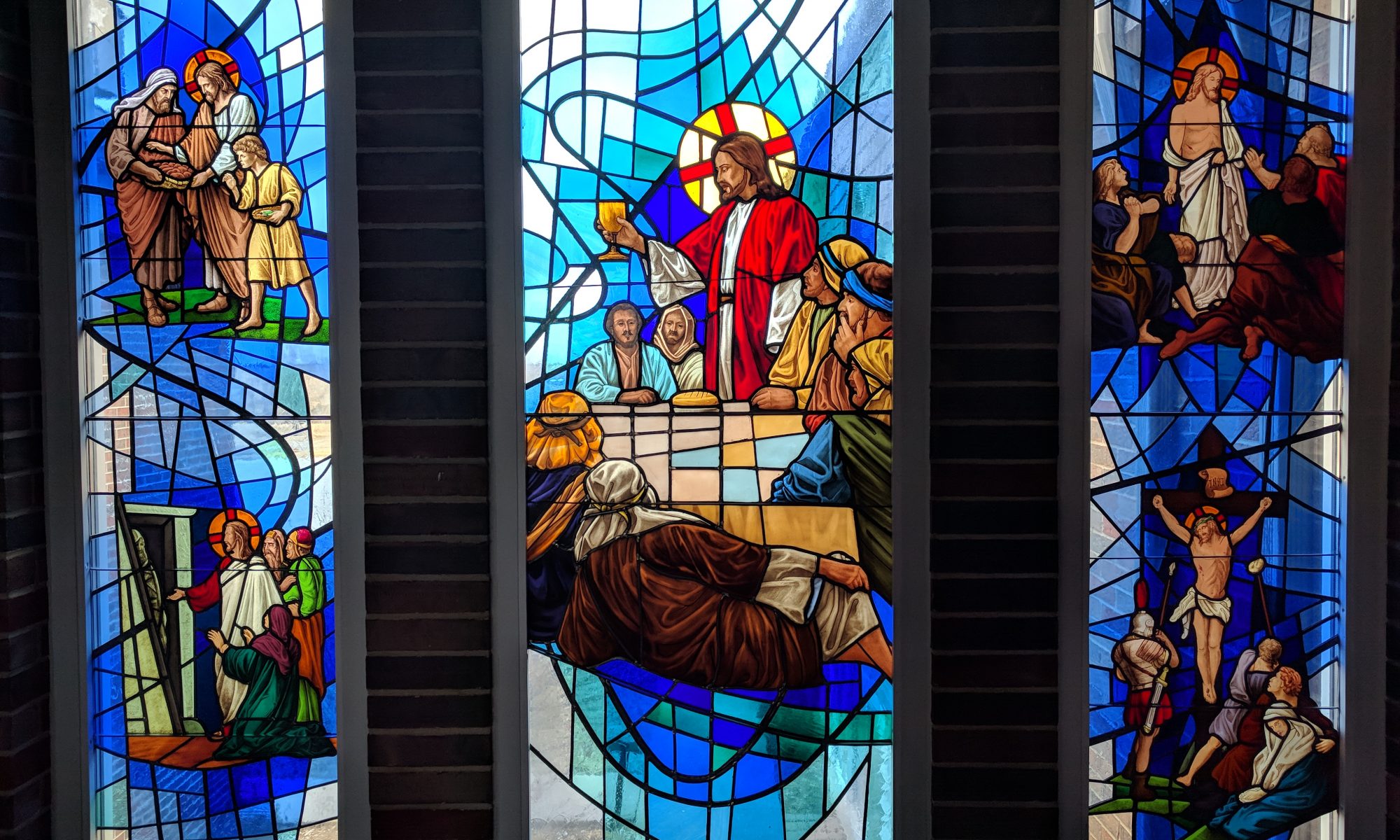
Lessons: Isaiah 55:1-9, Ephesians 5:15-21, Matthew 22:1-14
Hymns: LSB 828, 730, 725, 827, 830, 563
Grace, mercy, and peace to you from God our Father and our Lord and Savior, Jesus Christ. Amen.
The setting for today’s Gospel is Tuesday of Holy Week. Four and a half chapters in Matthew are devoted to this single day. In these chapters, Jesus delivers five parables, preaches concerning the End Times, and silences His scoffers. Today’s parable is spoken early that day, and it is the third parable in a series of three. They all touch on a similar theme. The first is the Parable of the Two Sons. Jesus asks which son does the will of his father—the one who says he won’t do it, regrets it, and then does it or the one who says he will do it and doesn’t do it. The chief priests and elders answered Jesus, saying the “The first.” Jesus replied, “Truly, I say to you, the tax collectors and the prostitutes go into the kingdom of God before you. For John came to you in the way of righteousness, and you did not believe him, but the tax collectors and the prostitutes believed him. And even when you saw it, you did not afterward change your minds and believe him” (Matt. 21:28-32). Here Jesus counts tax collectors and prostitutes as faithful unlike the chief priests and elders. For these church leaders said they would do the will of the Father and didn’t; whereas sinners didn’t at first do the will of the Father, repented, and followed Him.
The second parable is the Parable of the Wicked Vinedressers. A landowner planted a vineyard, leased it to vinedressers, and went to a far country. He sent servants to receive the fruit, but the vinedressers beat, killed, or stoned the servants. The landowner sent another round of servants, and the vinedressers did the same to them. So, the landowner sent his son, thinking they will respect him. But they seized him and killed him. Jesus then said to the church leaders, “Have you never read in the Scriptures: ‘The stone that the builders rejected has become the cornerstone; this was the Lord’s doing, and it is marvelous in our eyes’? Therefore I tell you, the kingdom of God will be taken away from you and given to a people producing its fruits. And the one who falls on this stone will be broken to pieces; and when it falls on anyone, it will crush him” (Matt. 21:33-46). Jesus is teaching that the Gospel is about to be spread those who are more grateful than the Jews, and destruction is coming to His people who reject Him.
The next parable is the one we heard in our Gospel reading, the Parable of the Wedding Feast. A king gives a wedding feast for his son, invites many, but they would not come. More were invited, but they also refused to come. Some busied themselves with something else while others seized the king’s servants, treated them shamefully, and killed them. This, not surprisingly, angered the king so he sent his troops and destroyed the murderers and burned their city.
This much of the parable matches the previous two. Jesus is speaking to the Jewish people—especially their leadership—and of their treatment of the promised Messiah and the prophets and apostles He sends. Too many Jews rejected Jesus. Some estimate 500,000 living in Israel at the time of Christ, while others estimate 3,000,000. Where were they when Jesus conducted His ministry? Yes, He had some large crowds to feed a few times. But it appears most people ignored His presence. Some certainly followed Him. But most of the Church leaders rejected Jesus as the Messiah. And so, Jesus tells these three parables to show what was going to happen to them. They would be judged and face God’s wrath. He took the kingdom from the Jews and gave it to those who would receive Jesus. In fact, He would punish the Jews by destroying Jerusalem about 40 years after Jesus ascended into Heaven. That’s when the Temple was destroyed by Romans as they conquered and demolished the city. The Jewish historian Josephus said about 1,000,000 Jews starved, were killed, or sold into slavery. God’s judgment was upon those who rejected Jesus. For there is no salvation apart from Christ. Many falsely believed then and many falsely continue to believe today that God will save all Jews even if they reject Christ. Many falsely believe the Jews will get to Heaven just because they are descendants of Abraham. Yes, Jesus said, “Father, forgive them for the know not what they do” when they were crucifying Jesus. But Jesus never taught they could get to Heaven apart from faith in Him. Salvation only comes through Jesus, for He alone atoned for the sins of the world through His bitter sufferings and death.
Under Roman control beginning in AD 70, Jerusalem became a secular city, and its population dwindled. The Jews scattered across Europe and Asia, as did Christianity through the preaching of the Gospel. For 18 centuries, there were no major movements among the Jews or Christians to restore Palestine to Jewish control. Christianity was banned in the Roman empire until AD 312, but the Church flourished underground across the Roman Empire. Many Christians settled in Israel beginning in the 300s. The Jews were forced out of Jerusalem in AD 70 until they joined forces with the Persians (Sassanids/Iranians) and drove out Roman (Byzantine) control in 614. Upon that victory, the Persians and Jews slaughtered thousands of Christians in Jerusalem. Just a couple decades later, the city would be conquered by the Muslims. Christians tried to return the land to Christians through the Crusades. And in the same year Martin Luther nailed the 95 Theses (1517), the Ottoman Turks (also Muslim) conquered Jerusalem. According to an Ottoman census in 1525, there were only 5,612 residents of Jerusalem, with 12% Christian, 21% Jewish, and 66% Muslim. In 1917, the British conquered the city during World War I and mandated the land be a Jewish national home which resulted in a mass immigration and, of course, much conflict. The British took a census in 1922 and counted about 750,000 in all Israel. 11% were Jewish, 9.5% were Christian, and 78% were Muslim.
Now 100 years later, there are about 10,000,000 living in Israel. About 74% are Jews, 21% Arabs, and 5% are others, which includes Christians. The terrorist attacks by the Muslims in recent weeks on Israel is clearly wrong. And so is the persecution of Christians by the Jews in the Holy Land. Worldwide, Christians have turned a blind eye to the Palestinian Christians who are suffering at the hand of the Jews in Israel. Zionist Christians are too focused on protecting Israel as a Jewish state, claiming the Jews have divine right to live in Israel, and that they must live there for Jesus to return. But the Bible does not teach this. It’s a false belief that began to be promoted in the 1800s (to learn more on this, see the handout in the narthex on “Whose Land Is It?”). There is nothing in the Bible that says the Jews must live in Israel. Instead, God wants something better for the Jews—that they know Christ, believe in Him, and, through faith in Christ, go to the Jerusalem above—Heaven. So what do we do about Israel? We pray for them, that there be peace and that all would hear the Good News of Jesus, believe in Him, and be saved. We pray that the land would once again become a Christian land, as is our prayer for all in our own land.
In the first portion of today’s parable, Jesus told of the invitation of the Jews to receive the saving Gospel. In the second part, the invitation is spread to all who will receive it. Jesus was saying that the Gospel will be spread to the ends of the Earth. All are invited, for the Lord’s desire is to fill Heaven. This means the Gospel is also for you. You do not have to trace your ancestry back to Abraham. Instead, the true Israel is the Christian Church. We are the true Israel. As Christians, we are the true sons of Abraham. We are God’s chosen people. We have been called out of darkness into the Lord’s marvelous light. We have been illumined by Christ. We have received His gifts. We are members of His family, adopted by Baptism, and covered with the very righteousness of Christ. He has invited us and has received us. God is happy that we now belong to Him by grace through faith.
Today’s Gospel is set as a wedding feast. Jesus, the Messiah is establishing Himself as the Bridegroom. Those who oppose Him are opposing God’s invitation to His banquet and to be the Bride of Christ. Those who receive Him celebrate with joy the salvation they receive. What a blessing it is to participate in the feast of the Gospel, even now! We hear of our Lord’s bleeding, dying love. We rejoice in His resurrection for we know that as Jesus lives, so shall we. He now feeds us a holy meal—the Body and Blood of Christ for our forgiveness.
The parable concludes in a way that may seem strange. You’d think the king would just be happy that the wedding hall is finally filled with guests. But he sees one not wearing the wedding garments supplied by the king. That one guest is bound hand and foot and cast into outer darkness where there is weeping and gnashing of teeth. Why does Jesus end the parable in this way? Because He first taught that the Jews will be condemned if they reject Jesus. Now He must also teach that anyone else will also be condemned if they also do not believe in Jesus. You see, it is only by faith can we be considered righteous. No one can get to Heaven according to His own terms. All are sinners; therefore, all sinners must be clothed with the garments God supplies to cover our sin. That’s what happens in Baptism. We are joined to the death and resurrection of Christ. We have died to sin and have arisen to newness of life. It is written, “For as many of you as were baptized into Christ have put on Christ” (Gal. 3:27). Isaiah declared, “I will greatly rejoice in the Lord; my soul shall exult in my God, for he has clothed me with the garments of salvation; he has covered me with the robe of righteousness” (Is. 61:10). When we are covered with the very righteousness of Christ, we are truly counted as worthy guests to our Lord’s Heavenly banquet, for our sin is taken away and we are seen as being as righteous as Jesus Himself is. Salvation awaits us. Amen.
The peace of God which passes all understanding keep your hearts and minds in Christ Jesus to life everlasting. Amen

